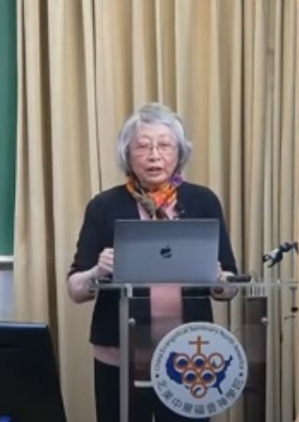
In traditional Chinese culture, deeply ingrained notions of gender roles, often expressed as "male strong, female weak," significantly influence the position of women in society and the church. This issue is particularly pertinent for female pastors navigating their roles in ministry. Rev. Dora Wang, Ph.D., from China Evangelical Seminary North America (CESNA), recently addressed this topic in a seminar, sharing her insights on the challenges women face in ministry and proposing strategies to support female seminary students in maximizing their God-given gifts.
Gender Roles in Chinese Culture
Rev. Wang opened her lecture by highlighting the pervasive influence of traditional gender roles in shaping relationships within Chinese churches. The male-dominated ethos of "male as authority, female as support" permeates both family life and church structures. In this context, women often find their ministry opportunities restricted to roles traditionally considered "suitable for women," such as children's ministry, women’s fellowship, or elder care. These positions, while vital, often limit women from taking on leadership roles like preaching, pastoral leadership, or leadership.
Rev. Wang shared a common scenario where women pastors, despite their theological training and ministry experience, are often assigned roles that align with traditional expectations rather than their individual calling or abilities. This marginalization leaves many women feeling unfulfilled and sidelined in their church communities.
Gender Disparities Among Pastors
Rev. Wang observed that the challenges female pastors face are not solely cultural but also relational, stemming from interactions with male pastors. Early in their ministry, women pastors often receive support and mentorship from their male counterparts, especially as they learn the ropes of pastoral work. However, as women pastors gain experience and excel in their roles, male pastors may perceive them as a threat to their leadership.
This shift can lead to resistance or even subtle competition, further complicating the dynamics within church leadership teams. Rev. Wang emphasized that this phenomenon is widespread, with many female pastors reporting struggles to collaborate effectively with male colleagues as they grow in their ministries.
The Realities for Female Seminary Students
Rev. Wang provided sobering statistics from CESNA, where only 3 out of 22 female graduates over the past decade continue to serve in church ministries. The others have either pursued further education, joined parachurch organizations, engaged in freelance ministry, or left ministry altogether.
This trend underscores a systemic lack of support for women in pastoral roles. Many female seminary graduates find limited opportunities to use their training and gifts in the church, often constrained by traditional expectations and organizational barriers.
Wage Inequality & Breaking Cultural Barriers
Rev. Wang also pointed to the significant pay disparities between male and female pastors. In one example from 2021, a female pastor earned $3,800 per month, while her male counterpart earned $5,500 for the same role. In some cases, female pastors' salaries are even halved, particularly in churches where the male pastor's wife serves as a "co-pastor" with minimal recognition or compensation.
This economic disparity not only affects women pastors' livelihoods but also reinforces their subordinate status within church leadership.
Rev. Wang stressed that addressing these inequalities requires challenging traditional cultural norms and reevaluating biblical teachings on gender roles. She argued that the Bible emphasizes the calling and gifting of all believers, irrespective of gender. Churches must therefore prioritize character and ability over gender when ordaining pastors or assigning leadership roles.
To foster an inclusive environment, Rev. Wang proposed creating platforms to support female pastors in exercising their gifts. This includes empowering women to take on leadership roles and providing opportunities for preaching and teaching.
Rev. Wang highlighted the importance of theological education tailored to equip women for ministry. Seminaries should offer specialized training to prepare female pastors for the unique challenges they may face. Additionally, churches must provide spiritual mentorship and emotional support to help women pastors remain resilient and confident in their calling.
Encouraging Women to Use Their Gifts
Rev. Wang concluded her lecture with a poignant reference to Pastor Nancy Lee’s adaptation of the Parable of the Talents. In this version, a female servant, entrusted with five talents, buries them out of fear of societal prejudice and male-dominated pressures. The servant’s failure to use her talents leads to rebuke from her master.
This story serves as a call to action for both churches and women pastors. Rev. Wang encouraged female pastors to courageously embrace their gifts and resist cultural pressures that diminish their potential. She also urged churches to cultivate environments where women can thrive in their ministry, ensuring that no God-given talent is wasted.
By addressing systemic inequalities and affirming women’s contributions to ministry, Rev. Wang believes the church can better reflect the inclusive and empowering message of the Gospel.







